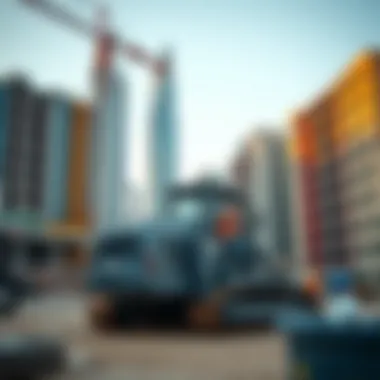Leading Construction Firms Shaping Dubai's Skyline


Intro
Dubai, a city known for its shimmering skyscrapers and ambitious architectural feats, is a global hub for construction and real estate development. The rapid growth of its skyline is not just eye candy; it reflects the driving force of a thriving economy. Investors, homebuyers, and real estate agents all have their eyes set on this captivating market, given its unique blend of luxury, innovation, and strategic location.
With numerous major construction firms at work, understanding the dynamics of this industry can provide critical insights into investment opportunities. This article aims to deep dive into the leading construction companies in Dubai, examining their standout projects and roles in shaping the city’s architectural identity. As we navigate through various sections, we will explore market trends and the potentials for savvy investors looking to take advantage of Dubai's booming market.
As the real estate market continues to evolve, knowing which companies stand at the forefront becomes essential. We’ll discuss their market influence, recent projects, and how they contribute to this diverse sector, giving you the tools to make informed decisions in this bustling environment.
Preface to Dubai's Construction Industry
The construction industry in Dubai has become a cornerstone of the city’s identity, reflecting both its rapid growth and ambitious architectural vision. As one of the world’s most dynamic cities, Dubai has captured global attention, offering an arena for innovation and pioneering infrastructure. This article seeks to delve into the layers that compose this fascinating industry, examining the top construction companies and their significant contributions.
Overview of the Construction Landscape
Dubai's construction landscape is a blend of modern marvels and traditional design aesthetics. The skyline is dotted with towering skyscrapers, such as the iconic Burj Khalifa and the Burj Al Arab, which are testaments to human ingenuity. Beyond these landmarks, the city is a hub of diverse architectural projects, ranging from residential neighborhoods to sprawling commercial complexes.
The construction sector faces not only challenges but also opportunities that shape its evolution. The emphasis on safety regulations, labor practices, and advanced building technologies are crucial to its success. A unique aspect of Dubai’s construction environment is the sheer scale and pace at which projects are completed, often outpacing the timelines anticipated in other global cities.
"Dubai has redefined what is possible in construction, where dreams take physical form at breakneck speed."
The landscape of construction in Dubai is impacted significantly by several factors:
- Investment Climate: The influx of foreign investment has catalyzed numerous projects, leading to a sustained growth trajectory.
- Government Initiatives: Support from local governing bodies, through initiatives like Vision 2021, promotes further advancement in the sector.
- Global Collaborations: Partnerships with international firms not only infuse capital but also bring cutting-edge technology and expertise.
Importance of Construction in Dubai's Economy
The construction sector isn’t just about erecting buildings; it's a vital engine driving Dubai’s economy. It accounts for a significant proportion of the emirate’s GDP and plays a critical role in supporting other industries, including real estate, tourism, and retail. The multiplier effect is striking; as new projects spring up, they lead to increased job creation and the demand for construction materials and services.
In essence, the sector supports a variety of jobs, from skilled labor to management positions, fostering a diverse workforce that reflects the cosmopolitan nature of Dubai itself. Furthermore, landmark ventures attract millions of tourists each year, underscoring the correlation between robust construction activities and economic prosperity.
Several aspects highlight the construction sector’s impact on Dubai’s economy:
- Job Creation: Thousands are employed in various capacities, ensuring steady income for many.
- Infrastructure Development: Infrastructures, such as public transport and utilities, enable the city’s further expansion.
- Investment Opportunities: The ongoing developments lure investors, establishing Dubai as a pivotal business hub in the Middle East.
- Cultural Integration: Icons like museums and exhibition centers contribute to a vibrant cultural landscape, enhancing the quality of life.
Ultimately, the interplay between construction and the economy cannot be understated. With every construction project, Dubai reinforces its position on the global stage, continuously pushing boundaries and setting standards of excellence.
Criteria for Ranking Construction Companies
Evaluating the top construction companies in Dubai involves a meticulous analysis of various factors. This section delves into the specific criteria that are essential for ranking these firms. Understanding these elements not only helps in identifying key players in Dubai’s bustling construction industry but also sheds light on the overall health and direction of the market. A close examination of these criteria reveals how companies navigate challenges and leverage opportunities in a competitive environment.


Project Portfolio and Experience
The project portfolio of a construction company is perhaps one of the most telling indicators of its capabilities. A strong portfolio includes a diverse range of completed projects that showcase a company’s expertise across different sectors. For instance, a firm might distinguish itself through high-profile residential towers, large-scale commercial complexes, and significant infrastructure developments. Each completed project adds a layer of experience, allowing companies to refine their operations, innovate solutions, and manage unforeseen challenges effectively.
Experience is also crucial. Established companies often have the advantage of a wealth of knowledge regarding regulations, material sourcing, and subcontractor management. They are better equipped to navigate the complex landscape of Dubai’s construction regulations. Consequently, investors and clients tend to favor companies with a proven track record, as this not only guarantees quality but also signifies reliability in meeting deadlines and budgets.
Innovation and Technology Integration
Innovation is the lifeblood of any successful construction company, particularly in a fast-paced market like Dubai. Advanced technology integration can drastically improve efficiency and reduce costs. For instance, many leading firms are now employing Building Information Modeling (BIM) to streamline planning and execution processes. This not only helps in visualizing projects before breaking ground but also facilitates collaboration among stakeholders.
Moreover, the adoption of sustainable materials and methods is increasingly viewed as a hallmark of cutting-edge operations. Companies that embrace green building practices not only contribute to environmental sustainability but also enhance their competitive edge in bidding for projects. It is evident that a commitment to innovation can transform the landscape of construction, making it vital to assess this criterion diligently.
Sustainability Practices
Sustainability has become a central theme within the construction industry, and companies that prioritize eco-friendly practices are often seen as more appealing by clients and investors. In Dubai, where rapid urbanization poses significant environmental concerns, sustainable construction practices are not just commendable but necessary. Companies implementing energy-efficient designs, waste management systems, and green certifications are forward-thinking and responsible.
This dedication to sustainability can be reflected in various ways, such as the use of reclaimed materials, the incorporation of solar energy systems, or water conservation technologies. Clients are increasingly looking at sustainability as a key factor in their decision-making process, making it indispensable to discuss how top construction companies address these challenges.
Client and Industry Reputation
A company’s reputation within the industry serves as a strong indicator of its legitimacy and reliability. Client testimonials and industry awards speak volumes about a firm’s performance and client satisfaction. Companies that consistently receive positive feedback from clients often enjoy higher repeat business and referrals, creating a snowball effect that enhances their standing in the market.
Furthermore, industry partnerships and collaborations can elevate a company’s profile. Firms that align themselves with reputable suppliers, clients, and contractors tend to build a robust network, which can lead to new business opportunities and increased trust from future clients. Evaluating a company’s reputation provides critical insights into how they are perceived in the construction landscape.
Leading Construction Companies in Dubai
Dubai's construction sector is a cornerstone of its rapidly evolving economy, showcasing both ambition and innovation in its skyline. The significance of the leading construction companies in Dubai cannot be overstated; they are pivotal in shaping not just the physical landscape but also the socio-economic framework of this vibrant city. By understanding the largest players in this field, investors, real estate agents, and potential homebuyers can gain insights into future trends, project quality, and market stability.
The leading companies have successfully executed monumental projects, from luxury skyscrapers to expansive infrastructures, which play a role in attracting tourism and business opportunities alike. Here's what makes these companies stand out:
- Reputation: The trust factor plays a critical role, especially for investors and clients. A company renowned for its quality promises a certain level of security in financial and safety terms.
- Innovative Practices: Many of these firms employ cutting-edge technologies, offering innovative solutions that streamline construction processes and enhance sustainability.
- Economic Impact: Major projects spearheaded by these companies contribute to employment opportunities, economic growth, and the overall development of the city's identity.
As we delve into the profiles of Dubai's foremost construction companies, we bounce between historical milestones and contemporary feats, aiming to impart a comprehensive understanding of how these entities influence Dubai’s future.
Company A: Overview and Major Projects
Company A stands as a beacon in Dubai's construction landscape, having been behind some of the city's most iconic structures. With a robust portfolio that includes high-profile projects like the Burj Khalifa and Dubai Mall, the company's footprint extends beyond just buildings; it signifies a blend of luxury, functionality, and cutting-edge design.
Key Projects:


- Burj Khalifa: The tallest structure in the world, not merely a building but a global symbol.
- Dubai Mall: A retail and entertainment hub that draws millions of visitors annually.
Company B: Distinctive Contribution and Achievements
What sets Company B apart is its commitment to integrating local culture into modern design. This company has garnered awards for its culturally relevant architectural styles, resonating with both locals and visitors.
Company C: Notable Innovations in Construction
Innovation is at the heart of Company C's business model. They incorporate advanced sustainable techniques and smart technology, making them a leader in eco-friendly construction. The developments include energy-efficient structures that significantly lower environmental footprints, showing that progress and sustainability can coexist.
Company D: Historical Significance and Future Prospects
Company D has an illustrious history in Dubai’s construction sector, dating back several decades. Its projects, such as the Dubai Marina, not only transformed the landscape but also created robust communities. Looking ahead, they are poised to leverage their historical expertise while adapting to new market demands.
Company E: Focus on Sustainability and Environment
Emphasizing environmental responsibility, Company E has made it a cornerstone of its operations. Their recent initiatives include developing green buildings that meet international sustainability standards, demonstrating a commitment that resonates well with today’s eco-conscious investors.
Company F: Client-Centric Approach
Company F places significant emphasis on understanding client needs, ensuring customer satisfaction from design to execution. Their tailored services attract a diverse clientele, including high-net-worth individuals and corporate entities.
Company G: Large-scale Infrastructure Developments
This company has been pivotal in delivering robust infrastructure projects that enhance the utility and accessibility of Dubai. Notable developments such as road expansions and metro stations are a testament to their capability and vision.
Company H: Specialization in Residential Projects
Company H exemplifies quality in residential construction, focusing on high-end apartments and villas. Their designs reflect a blend of modern luxury with traditional aesthetics, catering to a varied demographic.
Company I: Innovations in Commercial Spaces
With a focus on the commercial sector, Company I pushes boundaries in creating vibrant business environments. Their projects provide state-of-the-art facilities, vital for attracting multinational corporations to Dubai’s booming economy.
Company J: Renowned International Collaborations
Company J has made waves through strategic partnerships with international firms. This approach not only brings new technology to Dubai but also enhances its market competitiveness, enriching the overall quality of construction within the city.
Future Trends in Dubai's Construction Sector


The construction industry in Dubai is one that never sits idle; it’s always pushing the boundaries to keep up with changing demands. As this city shaped by innovation continues to grow, various future trends are becoming increasingly prominent. Understanding these trends is crucial not just for stakeholders within the industry, but also for investors and potential homebuyers who are keen on the ever-evolving real estate landscape.
Technological Advancements
Technology is at the heart of every industry's evolution, and construction is no exception. In Dubai, emerging technologies such as Building Information Modeling (BIM), drones, and automation are reshaping how projects are planned and executed. The use of BIM allows for precision in design and construction, enabling teams to visualize projects before breaking ground. This leads to fewer errors and reduces waste, ultimately saving both time and money.
Drones are being utilized for site surveys and inspections, offering a bird's-eye view that enhances project management and safety audits. Moreover, 3D printing is becoming a game changer in the construction field, with some firms already using it to create elements of buildings, drastically cutting down the construction time.
"Whether it is through AI-assisted planning or energy-efficient designs, the aim is the same: to build smarter and faster."
In essence, companies that incorporate state-of-the-art technology will not only improve their operational efficacy but also stay competitive in a market that demands efficiency and speed.
Urbanization and Smart City Initiatives
As the population swells, urbanization becomes a necessity. Dubai is embracing this trend with both arms, especially with its Smart City initiatives. The integration of IoT (Internet of Things) in construction landscapes means that homes and buildings can communicate with their inhabitants—adjusting temperatures, lighting, and even energy usage in real-time.
Additionally, these initiatives help in better traffic management, waste disposal, and overall infrastructure development, creating an environment conducive for business and tourism. The aim is to ensure that residents live in smart, connected spaces that respond to their needs, making projects more desirable and marketable.
Shifts in Global Market Trends
The construction sector does not operate in a vacuum—global market trends have a significant reflection on local practices. As sustainability becomes a global priority, Dubai's construction companies are taking notes. Clients and investors are increasingly looking for eco-friendly options, and companies that focus on sustainable building materials start to gain ground.
The influence of foreign investments also plays a crucial role. As Dubai continues to attract international firms and expatriates, the demand for residential as well as commercial spaces is likely to rise, leading to innovative solutions aimed at enhancing livability while keeping in stride with contemporary trends.
In summary, familiarity with these trends will put stakeholders in a vantage point, making informed decisions that align with the future direction of Dubai's construction sector. Engaging with technology, promoting smart living, and acknowledging global shifts will build the foundation for a resilient and prosperous industry.
Finale
The construction industry in Dubai is not just about building structures; it's about shaping the future of a city that draws the eye of the world. As we draw this exploration to a close, it's vital to take a moment to reflect on the key insights gained and their implications for various stakeholders in this dynamic market.
Summary of Key Insights
In seeking to understand the construction landscape in Dubai, several crucial points stand out:
- Leading Companies: The notable firms in Dubai's construction sector each demonstrate unique strengths and innovations that underline their positions in a competitive market.
- Technology & Sustainability: An increasing focus on technological integration and sustainable practices shapes how projects are planned and executed. From advanced robotics to energy-efficient practices, these elements are no longer optional; they are integral to success.
- Economic Impact: The construction industry plays a pivotal role in Dubai's economy. With investments pouring in, it not only supports infrastructure development but also creates numerous job opportunities, further enhancing the city’s allure as a global hub.
- Future Trends: As urbanization accelerates, the shift towards smart city initiatives underscores the need for adaptive approaches in construction, ensuring that the cities are not just built but are livable and resilient.
Overall, understanding these elements allows potential investors and stakeholders to make informed decisions in the ever-evolving market.
Implications for Stakeholders
For investors, real estate agents, developers, and even homebuyers, the insights from Dubai's construction sector hold significant weight:
- Investment Opportunities: Recognizing which companies are leading the charge can direct funding and interest to projects poised for success. Circling back to the companies discussed, those who engage with their innovative and sustainable practices often reap rewards in terms of investment returns.
- Market Dynamics: Knowledge of the ongoing trends can shape strategic decisions. Market fluctuations driven by technological advances or shifts in consumer preferences must be considered for timely interventions or capitalizing on emerging opportunities.
- Collaboration Possibilities: Real estate agents and developers can identify synergies with leading construction firms by grasping their specialties and contributions, opening doors to fruitful partnerships.
By understanding the nuances and dynamics of the construction market, stakeholders are not just passive observers but active participants in shaping the skyline of Dubai.
For further reading and in-depth insights, consider visiting resources such as Construction News, Dubai Land Department, and Gulf News about construction to stay ahead in the game.















